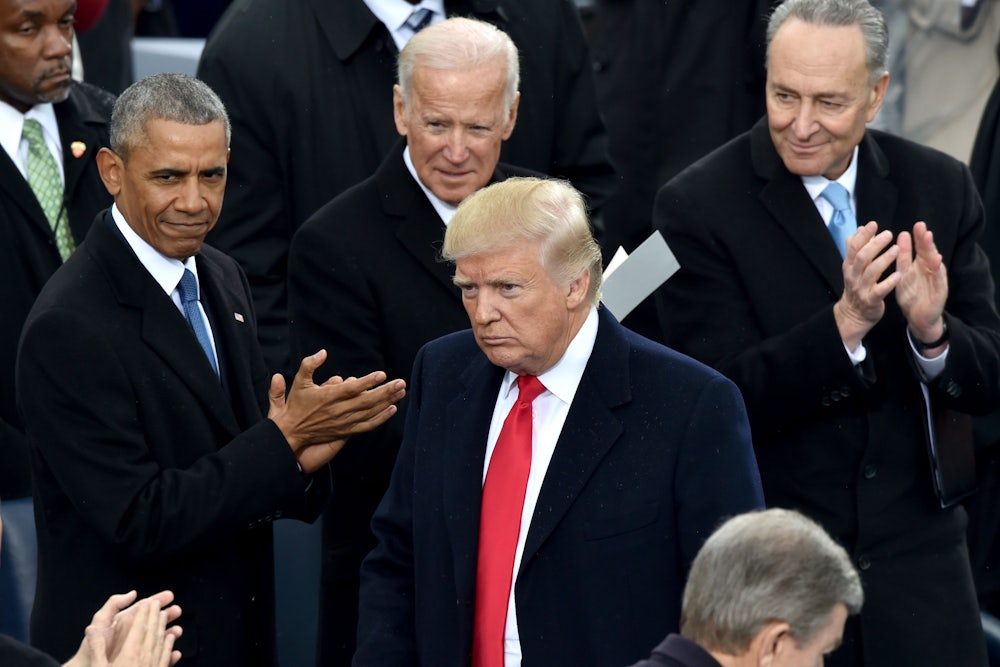President Donald Trump’s firing of FBI Director James Comey on Tuesday increasingly looks like a preemptive coverup. The New York Times reports that in the days before Comey was fired, he requested “a significant increase in resources for the bureau’s investigation into Russia’s interference in the presidential election.” This adds to the growing body of evidence that the main cause of Comey’s dismissal was not, as the Trump administration claims, his handling of Hillary Clinton’s email scandal, but Comey’s pushing for a deeper investigation into possible collusion between the Trump campaign and the Russian government.
Comparisons between the current political crisis and the Watergate scandal are now flying fast and thick, with many parallels drawn to Richard Nixon’s firing of special prosecutor Archibald Cox in the so-called Saturday Night Massacre. Yet these analogies miss a crucial distinction: While firing Cox accelerated Nixon’s spiral toward resignation, there is every reason to believe that Trump’s firing of Comey will in fact buy him more time, and might even help bury the Russia scandal for good.
The key difference between 1973 and 2017 is that Nixon faced a Democratic Congress, while Trump has the luxury of a Senate and House of Representatives under Republican control. The Saturday Night Massacre infuriated the Democratic majority and emboldened them to push ahead with the investigation. By contrast, in 2017 Republicans continue to provide cover for Trump.
Senate Majority Leader Mitch McConnell defended Trump’s firing of Comey and continues to oppose calls for a special prosecutor, saying on the Senate floor, “Today we’ll no doubt hear calls for a new investigation which can only serve to impede the current work being done.” McConnell’s sentiments are the consensus among Republican legislators. Maine Senator Susan Collins said that the idea Comey was fired over the Russia investigation was “misplaced.” Florida Senator Marco Rubio said he was “surprised” by Trump’s actions, “but it’s a decision the president’s made and we’ll go from here.”
The lay of the land is clear: By firing Comey, Trump will successfully stall the FBI investigation. After all, is any Trump-appointed director likely to ask for the significant increase in resources that the investigation apparently requires? Meanwhile, Republicans in Congress will run interference for Trump. The only hope for a full investigation, then, is for Democrats to take back the House of Representatives, and possibly the Senate, in 2018. Control of either chamber would give Democrats the leverage needed to revive the investigation—and to start checking Trump’s wider abuses of power.
Democrats need to make Trump’s attempts to quash the Russia investigation a key campaign issue, one that implicates not just the president but also his party. Until now, there was good reason to avoid making the investigation so pivotal. For the sake of its long-term health, the Democratic Party needs to rebuild its status as a champion of average Americans, by focusing on issues like health care and the minimum wage. But Trump’s scorn for democratic norms has become so prominent a feature of his presidency that it can’t be avoided.
There’s another good reason for Democrats to focus on the Russia: The story drives Trump mad. As Politico reported this morning:
[Trump] had grown enraged by the Russia investigation, two advisers said, frustrated by his inability to control the mushrooming narrative around Russia. He repeatedly asked aides why the Russia investigation wouldn’t disappear and demanded they speak out for him. He would sometimes scream at television clips about the probe, one adviser said.
The intensity of Trump’s anger can be seen in the genuinely unhinged tweets he sent out this morning:
Watching Senator Richard Blumenthal speak of Comey is a joke. "Richie" devised one of the greatest military frauds in U.S. history. For....
— Donald J. Trump (@realDonaldTrump) May 10, 2017
years, as a pol in Connecticut, Blumenthal would talk of his great bravery and conquests in Vietnam - except he was never there. When....
— Donald J. Trump (@realDonaldTrump) May 10, 2017
caught, he cried like a baby and begged for forgiveness...and now he is judge & jury. He should be the one who is investigated for his acts.
— Donald J. Trump (@realDonaldTrump) May 10, 2017
From the point of view of an opposition party, anything that can get the president so blinkered with rage has merit. An angry Trump is a self-destructive Trump. Hammering him over the Russia investigation will further cloud his judgment, causing him to make more impulsive and damaging decisions, and distracting him from pursuing his agenda.
By firing Comey, Trump has created the biggest political crisis in American politics since Watergate. The Democrats have very few weapons to wield against Trump right now, but they can continue to poke and prod him, using the ensuing controversy to rally opposition to Trump. American democracy is in real danger, and the Democrats now have a duty—one that transcends partisan politics—to make those stakes clear to the electorate.
